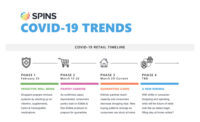Economy is top concern for food and beverage companies amid coronavirus crisis
Exclusive BNP Media survey details impact of the coronavirus pandemic on food and beverage manufacturers.

The coronavirus pandemic has the majority of food and beverage processors significantly concerned about the economy. In fact, 80% of food and beverage companies surveyed between April 2 and April 6 indicated they are significantly concerned (rating it between 8 and 10, where 10 represents the highest level of concern), according to an April 8, 2020, Clear Seas Research report titled “Food & Beverage Manufacturing Industry, Industry Perspective on the Challenges of Today.”
Clear Seas Research is part of Troy, Mich.-based BNP Media, the parent company of Dairy Foods. The report is the second installment in a series related to food and beverage processing operations during the coronavirus pandemic. (Visit https://tinyurl.com/qvytt64 to read our coverage of the first installment, based on surveys fielded the week of March 23.)
More survey respondents expressed significant concern about the economy in early April than did in March (when 78% did so). Other top-five manufacturing-related concerns include friends/family becoming infected by COVID-19 (72% vs. 64% in March), achieving business goals over the next three months (62% vs. 75% in March), business stability for the next 12 months (58% vs. 69% in March), and a tie between achieving business goals over the next six months (53% vs. 73% in March) and supply chain disruptions (53% vs. 66% in March).
In terms of the coronavirus pandemic’s impact on operations, 63% of respondents (vs. 64% in March) indicated that they have seen a decline in new business development activity in comparison to a year ago, while 14% said they have noted no change (vs. 12% in March). Almost a quarter of respondents (23%), meanwhile, reported an increase in new business development activity — the same as in March.
Two-thirds of respondents (66%) reported a decline in business spending (vs. 54% in March), while 21% indicated there was no change (vs. 32% in March) — and 13% reported an increase (vs. 14% in March).
The research also showed that 53% of planned business is on schedule (vs. 56% in March), while 27% has been delayed (the same percentage as in March) and 20% has been canceled (vs. 17% in March).
Download the report here.
Looking for a reprint of this article?
From high-res PDFs to custom plaques, order your copy today!





